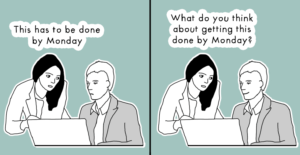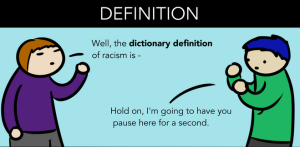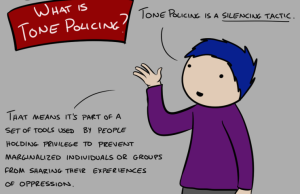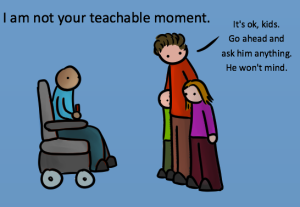
Source: Free the Pill
I used to have a friend who’d say, “I don’t know if what I say is problematic, so just tell me if it is!” Of course, I agreed to do so.
Nobody can know everything, so it’s natural to slip up sometimes and say something oppressive – even if you mean well.
But this friend didn’t just slip up sometimes. She continuously said things that ranged from insensitive to downright oppressive, and she didn’t stop even after I pointed them out to her.
I quickly realized that there’s a difference between making a mistake and not putting in any effort whatsoever to check the oppressive attitudes you harbor.
Unfortunately, white people often do the latter when they ask people of color to just tell them if something they said is racist, instead of making an effort not to be racist in the first place. They expect that this will be enough to cure their racism.
Spoiler alert: It won’t.
Making a mistake is normal when you’re trying to unlearn your privilege. But as I pointed out above, there’s a difference between a sincere mistake and a complete lack of effort.
Let’s break it down with an analogy. It’s a simple analogy that doesn’t cover all the nuances of white privilege and racism, but it does the job for the purposes of this article.
Say that you have a penchant for breaking people’s toes. It’s only on accident, but you’re a decent person and you don’t want to keep doing it.
What do you decide to do? Well, you tell people, “Just let me know if I break your toe!” Then you proceed to go about as you always have.
Obviously, that isn’t going to solve anything. You’re still going to be breaking people’s toes because you’re not watching where you’re going. And even if they tell you that you did, it doesn’t mean that their toe will magically become unbroken.
What’s worse, these people continuously get their toe broken. There’s nothing they can do to stop it, either. There’s no toe guard they can buy, and little medical care or time off that they can take in order to get better.
Imagine telling these people that the solution to their broken bones is to just tell the toe breaker after the fact. How many toe breakers will they have to tell before they get reprieve, if any?
That’s sort of what it’s like when you tell people of color to simply inform you when you’ve been racist. You put the burden on them to fix your toe breaking ways when they’re not the ones responsible for it in the first place.
That’s emotionally draining for people of color. Imagine getting your toe broken all the time, when along comes a well-meaning person who wants to help. Except all they do is say, “Just tell me if I’ve broken your toe!”
That’s why anti-racism work requires white people to be the first person to tell themselves, “That’s racist.”
Put another way, you have to put in the effort to unlearn the oppressive attitudes ingrained within you.
Otherwise, what really changes? You could learn that something you said is racist, but until you understand why it’s racist, what’s to stop you from making the same mistake again?
What I’m saying is, being told when you’re racist isn’t enough to cure your racism because racism isn’t just an offensive phrase or joke: It’s a deeply ingrained set of beliefs that expresses itself through the things you say.
I know it sounds difficult to overcome when I put it that way. Luckily enough, though, there are several things which you can do in order to begin unlearning those beliefs on your own.
1. Think Before You Speak
Simple, right? Before you speak, take a moment to think about whether or not what you’re saying might be racist.
Of course, over the years, I’ve heard white people express their concern about this very thing. They say that they’re afraid to talk to people of color because they don’t know if what they’ll say is racist.
Well, you could say that you’re afraid to walk around because you might break someone’s toe — but the person who might get their toe broken is in much greater danger than you.
I understand that it can feel scary to say something because it seems like so many things are interpreted as racist these days. But that’s the thing: They are racist.
It’s just that racism is so deeply ingrained within us that we don’t even realize they’re racist in the first place.
I know that it’s disheartening to discover just how many things are racist when you start thinking about it, but then again, being an ally is never easy.
Besides, if you find out that something is racist, why would you want to keep saying it? It’s like saying you really want to stop breaking people’s toes, but it’s just too much trouble to find a way to avoid doing so.
It might be difficult to check all the racist things you say or joke about, but trust me: You can do it.
Plus, the extra effort you put in to think before you speak could spare someone else a lot of pain — and that’s always worth it.
2. Google Things
Trust me, if you’ve had to wonder whether something you think is racist, someone has probably talked about it.
There’s no shame in not knowing. Like I said, it’s impossible to know everything.
Googling something on your own also relieves people of color from the task of having to explain it to you. I’m not saying I’m never down to explain things to allies. I’m just saying that it’s tiring having to explain over and over why Tiger Mom stereotypes are racist.
Googling things is also related to the third alternative, which is…
3. Read – And Read A Lot
There are a lot of blog posts, articles, and even vlogs out there by people of color explaining race and racism in easy and accessible ways.
If you’re serious about being an ally, you have to be willing to put in the effort to search for these readings and learn from them.
Doing so, and then sharing those readings, helps amplify people of color’s voices. It’s another way in which you can actively contribute to anti-racist work. (Think of it as distributing manuals on how to avoid breaking toes.)
As I said earlier, if you don’t understand why something is racist, you might commit the mistake again.
Maybe you won’t say the exact same racist thing, but chances are you will say something similar — and that’s because the underlying belief that drove the first comment was never changed.
In order to begin challenging those underlying beliefs, you have to learn what they are and why they exist in the first place. The best way is to read and listen to people of color who’ve done the hard work and critical thinking required to break it down.
All you have to do is approach it with an open and willing mind.
4. Treat People of Color Like People
I’m not talking about being colorblind.
I’m talking about recognizing that although the lives of people of color are influenced by their race, they aren’t defined by it.
In other words, while it’s necessary to be aware that my experiences are shaped by the fact that I’m Asian American, it’s also important to remember that in other respects I’m just like anyone else: I have hopes, dreams, and fears, too.
It’s okay to talk to me about those things. I welcome it, in fact, and I’m sure other people of color do as well.
It gets kind of tiring talking to someone who won’t engage with you genuinely because they’re worried they’ll say something wrong.
On top of that, one of the other pitfalls of only seeing race when you talk to a person of color is that you end up treating them as a learning portal.
In other words, you only want to engage with them as a way for you to educate yourself.
I’ve had people do that to me, and it feels pretty dehumanizing. It’s like I’m nothing more than a search engine to them. And since one of the central tenets of racism is dehumanizing and objectifying people of color, that’s more than a little racist.
So be aware of your privilege, but don’t reduce any person of color to simply their race. Treat people of color as people. Believe me, it’ll make a difference.
5. Learn How to Apologize Genuinely
You’re going to make mistakes. Accept this fact, and then learn how to handle it when you’re wrong.
That means apologizing, listening, and then promising not to do the same problematic thing again. It’s important to say “I’m sorry” and not “I didn’t mean it that way” or “I didn’t say that.” You did something wrong, so own up to it.
Then promise not to do the same thing again — and stick to it. You might feel bad, but that won’t change what happened.
Instead of feeling bad, follow the other steps listed above: Think before you speak; Google things you’re uncertain about; do the research; and treat people of color as people.
They’re basic things, but I promise they make a difference.
***
The road towards unlearning any kind of privilege is long and difficult. It takes perseverance, and also a certain humility: There’s only so many times you can be called out for being wrong before you start feeling down.
That’s okay, though. Nobody knows everything. That shouldn’t stop you from continuously trying to learn — as long as you don’t expect marginalized people to do the work for you.
If you’re committed to unlearning white privilege, then you have to commit to the hard work that it takes. You can’t just rely on someone else to cure you of your racism.
So follow the steps above. Don’t shy away from examining yourself and calling yourself out.
And remember: You’re the first and only person you should rely on when trying to unlearn your racism.
[do_widget id=”text-101″]
Kerry Truong is a Contributing Writer for Everyday Feminism. They are a queer diasporic Vietnamese womxn and graduated this spring with a double degree in English and Asian American Studies. When they’re not philosophizing about this at length, they’re reading, taking long walks, or cooing over all the dogs who cross their path. Read their Everyday Feminism articles here.
Search our 3000+ articles!
Read our articles about:
Our online racial justice training
Used by hundreds of universities, non-profits, and businesses.
Click to learn more




















